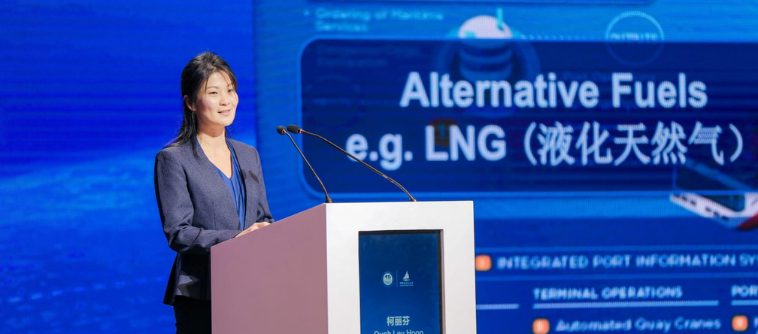
Quah Ley Hoon outlines how the pandemic has forced a focus on the difficult balancing act between public health risk and business continuity in the face of long-term uncertainty.
When Quah Ley Hoon was offered a scholarship by the Singaporean government to study an MBA, she grasped the opportunity with both hands. As a self-confessed Francophile who earned her MA in France, she has logged more than a decade of public service across various government ministries in Singapore. Never afraid to take on a new challenge, she also holds a distance learning degree in psychology and has amassed five years of media experience as Chief Editor of Channel NewsAsia.
In January 2019, she became the first female Chief Executive of the Maritime and Port Authority of Singapore. It has proved to be an endlessly challenging position, helping her to expand her managerial horizons. But she has risen to the scale of the task aided by her deep managerial and leadership experience across public policy, trade, finance, the environment and the media. Perhaps just as important in helping her land and grow into the role, however, is her humble approach to professional development, acknowledging the scope for learning and growth in all circumstances
“I think it’s important to adopt a servant leadership type of mindset; listening, being open and recognizing that you don’t have all the answers. I am constantly amazed by how much more I learn through this approach,” she says.
This servant leadership mindset has doubtless proved crucial in an industry that encompasses a complex value chain and whose environmental targets require extensive public-private sector collaboration. Steering a rapidly-evolving sector through a pandemic that has placed a high degree of responsibility on shipping for the viability of the global supply chain has certainly not made things any easier. She acknowledges that, like many industries, the pandemic has forced the sector into striking a difficult balancing act between public health risk and business continuity. Keeping ports open and ships moving at a time of uncertainty, including evolving border policies between countries, has added another layer of complexity.
Having spearheaded a whole host of initiatives aimed at keeping ports flowing, she believes that for a sector that often shies away from the limelight, it has been able to lean on its strong sense of purpose to keep disruption to a minimum.
“I have been very heartened by the fact that the maritime industry remains quite resilient. But most important is the sense of mission in the industry. We are the backbone of the supply chain and the sense of professionalism to keep things going is strong,” Quah says.
She credits the MBA at IMD, which she completed in 2010, for helping her to navigate this terrain, and highlights the emphasis on practical case studies and teamwork in the programme, incorporating people from a diverse range of cultures and backgrounds, for helping her to kickstart a journey of self-discovery.
“What is attractive about IMD is that it is quite a cosy and boutique MBA, where the journey is not about the individual but about being exposed to teamwork and diversity. You recognise that there is always an opportunity to make a difference in someone’s life, not just in monetary terms, but in terms of sharing your experiences and knowledge. You really learn about yourself, it’s quite illuminating.”
The focus on teamwork has put Quah in good stead for a port authority role that involves managing and motivating a team of around 800 people, often in very stressful and intense circumstances.
She cautions on the importance of finding a sense of balance. Professionally, that means taking on the role of angel and devil at the same time, both as a regulator and a cheerleader for sector. As someone with a strong commitment to family life, she advises balancing professional self-improvement and upskilling with making sure that she spends enough time with her children. How to navigate that trade-off depends on a person’s circumstances, profile and level of family support, she says.
Find out more about the IMD MBA.


